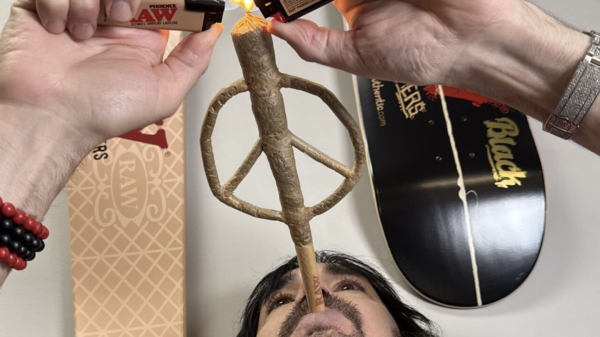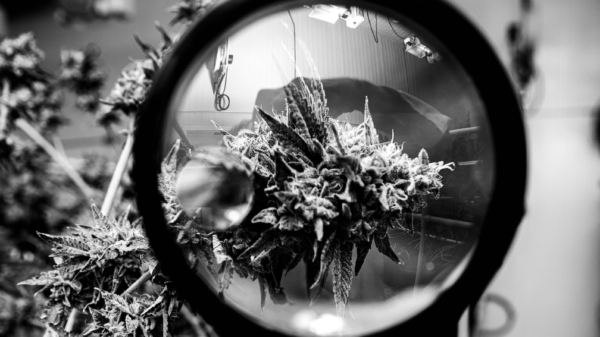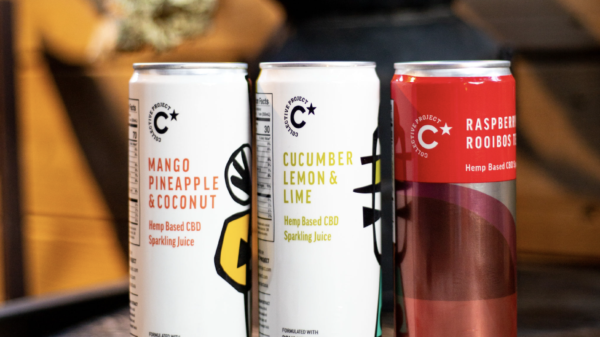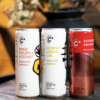Browsing the display cases of a sanctioned weed store in Washington state, your eyes are subjected to a feast of vibrant colours and marijuana mascots.
Pot shops north of the border tell a simpler visual story. Rows of homogeneous boxes leave both more to the imagination, and less to be imagined.
But Canada’s strict rules on the promotion of cannabis products haven’t completely halted efforts to appeal to the emotive side of consumers. Brands like Leafs By Snoop — which goes by LBS in Canada — will no doubt invoke classic weedisms in at least some fans of the West Coast hip-hop icon.
Last week, the Trailer Park Buds brand hit Canadian stores. Its name, familiar-block text logo and strains named after memorable ad-libs draw a direct line to the hit TV show.
Read more: Trailer Park Buds hits legal market, raising questions about legal promotion

Organigram’s Trailer Park Buds logo is styled almost identically to the branding of the Trailer Park Boys via a licensing agreement. Image from the Cannabis-NB website
The closeness of those elements combined with an apparent delayed release of four-years led many to believe the brand was held back by promotional restrictions. Upon the release of the products last week, with the references to the show intact, industry insiders concluded that the promotional rules had loosened or the brand was due for enforcement from our national regulator.
Subsection 17(1) of the Cannabis Act states that cannabis can’t be promoted “by presenting it or any of its brand elements in a manner that associates it or the brand element with, or evokes a positive or negative emotion about or image of, a way of life such as one that includes glamour, recreation, excitement, vitality, risk or daring.”
At first glance, an interpretation could read the Trailer Park Buds as a brand element associated with the events depicted in the show, and elicit the positive connection a fan would have to the Trailer Park Boys brand. But that’s far from the only interpretation, and there are other factors for regulators to consider. For example, does it matter that the audience of this particular show is primarily adults?
As it stands, there are no clear answers to these questions. However, experts who have been following Canada’s short but complicated history of cannabis promotion have highlighted the lack of clear guidance on the rules, the challenges this knowledge gap poses for the industry, and the need to take risks while respecting the mandates outlined in the country’s legalization program.
Promotional restrictions ‘particularly challenging for the industry’
Regulatory head honcho Health Canada has thus far mirrored the ambiguity found in the written rules themselves.
“We are not in a position to comment on this specific situation at this time,” it told Mugglehead in an emailed statement.
When reviewing compliance issues, what Health Canada did say is that it considers each situation on a case-by-case basis, accounting for a range of factors including the purpose of any promotion, its content, context and intended audience.
“The Cannabis Act aims to protect public health and public safety and, in particular, to protect young persons and others from inducements to using cannabis,” the regulator said. “That is why the Act includes prohibitions on promotions that appeal to youth, promotions of sponsorship of people, events or buildings, promotions through testimonials or endorsements, or promotions that present a product or brand in a manner that associates it with a particular way of life.”
What can be acceptable promotion, Health Canada says, are specific types of marketing that allow adult consumers to have access to clear, objective information to make informed decisions. Such promotional information can be sent via email addressed to an adult by name, presented in a store where minors are prohibited by law or via websites and social media where “reasonable steps” are taken to ensure young people can’t accesses it.

Muse Cannabis store manager Frida Hallgren stands in front of shelves stacked with the boxes and jars of limited personality characteristic of Canada’s regulations on branding. Photo by Nick Laba
Okay, so no info sheets on weed gummies given out at a candy store — that much is clear. Yet at the same time, are age gates really preventing curious teens from accessing promotional cannabis materials on the web?
Promotional restrictions in the Cannabis Act have been particularly challenging for the industry, says Trina Fraser, a partner at Brazeau Seller Law. Provisions are broad in scope, she says, and prohibitions related to ideas like a “way of life” are subject to interpretation.
“Thus far, we don’t have any court decisions interpreting these provisions,” Fraser said. “Health Canada does not provide advance rulings or approvals of packaging or advertising, and compliance letters are kept confidential.”
Because people in the industry closely watch what others are doing — a practice she warns against — it’s not surprising to her that they infer interpretive guidance from how Health Canada does and doesn’t appear to respond to situations.
“Certainly, there is a feeling within the industry that the promotional provisions of the Cannabis Act are overly strict and go beyond what is required for public health and safety purposes,” Fraser said. “I don’t expect legislative change to the promotional restrictions anytime soon, so we are left with the hope that we’ll have more clarity on compliance as we go forward and that these provisions will be interpreted and enforced in a manner that will permit the industry to grow in a responsible manner.”
Doing something unique isn’t without risk
Organigram, the company behind the Trailer Park Buds, explained that they don’t believe their branding violates the promotional prohibitions, nor is it their intention to violate them.
Senior VP of marketing Ray Gracewood said his company is operating under a licensing agreement to have a brand name that shares design elements with the Trailer Park Boys trademark, but is otherwise unassociated with the brand.

Mike Smith, Robb Wells and John Paul Tremblay created a worldwide Canadian sensation with their hit television show. Photo by Jason Bain via Wikimedia Commons
“The license agreement is intended to mitigate trademark litigation risk as we move forward with the Trailer Park Buds brand,” he said. “There is no involvement from the Trailer Park Boys franchise, its characters, actors, or creators in the promotion of the Trailer Park Buds brand.”
Industry expert and cannabis business consultant Natasha Perkins points out that Organigram had to notify officials 60 days in advance of products hitting shelves, and are responsible for doing voluntary recalls if something were wrong with their products. So although it’s not entirely clear what, she says there’s something to take away from the fact that Health Canada hasn’t clamped down on, or targeted this as an issue.
“We’re getting comfortable trying to figure out what is allowable within actual legislation and regulations, and also the spirit of the law,” she said.
This is an adult product using brand equity from another adult avenue, Perkins added: It’s not fully copying the Trailer Park Boys and it could be argued that it is, like Organigram said, arm’s length altogether from that brand.
As someone in the industry, she says sometimes you have to skirt the line really closely, and hopefully you have some sort of intelligent stance as to why you’re doing what you’re doing.
“If you want to try and do something unique and special,” Perkins said, “in this industry, it’s not without some degree of risk. But typically organizations will have done a thorough legal analysis on the risk and how they might argue their stance.”
Top image: Rapper Snoop Dogg on the High Road Summer Tour 2016 at the Molson Canadian Amphitheatre. Photo by Charito Yap via Wikimedia Commons
nick@mugglehead.com
@nick_laba















dirk diggler
May 11, 2020 at 7:35 pm
A better title for this would be ‘person who doesn’t understand thing is confused by it’.